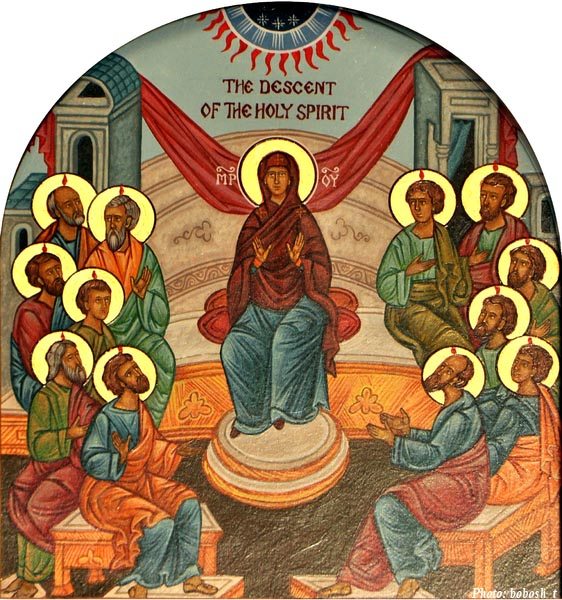
“O Love Divine, O sacred bond that unites the Father and the Son, almighty Spirit, faithful Consoler of the afflicted, penetrate the profound depths of my heart and make Thy resplendent light shine therein. Pour out Thy sweet dew upon this desert land to end its long aridity. Send forth the heavenly darts of Thy love into the sanctuary of my soul to light up burning flames that consume all my weaknesses, negligence, and apathy.
Come, o sweet Consoler of desolate souls, refuge in danger, and protector in distress.
Come, Thou Who washest souls from their stains and healest their wounds.
Come, strength of the weak, support of those who fall.
Come, doctor of the humble and defeater of the proud.
Come, Father of orphans, hope of the poor, treasure of the indigent.
Come, star of sailors, safe harbor of the shipwrecked.
Come, strength of the living and salvation of the dying.
Come, O Holy Ghost, come and have mercy on me. Make my soul simple, docile and faithful, and graciously bear with my weakness with a kindness so great that my smallness may find favor before Thy infinite grandeur, my powerlessness before Thy strength, and my offenses before the multitude of Thy mercies. Amen.”
* * *
First of all, I would like to note how in this prayer Saint Augustine really soars to unimaginable heights right from the start, and even when you do not stop to analyze every word. This most beautiful prayer contains passages that need to be analyzed.
“Faithful Consoler of the afflicted.” To console is not merely to sooth a person’s affliction and encourage him. It is to strengthen him. To “console” properly speaking is to give strength. So a “faithful consoler” is one who always gives strength. Fortifier and continuous strengthener of the afflicted: this tells us much more accurately what we need to ask for: Not just in order to have a sense of encouragement and hope amidst the hardships of a very deep trial, but to have the strength to weather that trial. Not bravado or swordsmanship, but real strength!
“Penetrate the profound depths of my heart and make shine therein Thy resplendent light… “Heart” here means affection and is not employed lightly but very appropriately, and yet it means a whole lot more: the depths of the soul, where the tendencial Revolution takes place — they are, so to speak, a “subconscious of the soul.” So the prayer asks the strength of the Holy Ghost to penetrate and strengthen the person’s soul. It is a mysterious place inside the soul where darkness makes it difficult to perceive what happens.
Another element to note is that the prayer does not ask so much for a word, but for a light. You can see the scope of this prayer.

“Pour out Thy sweet dew on this desert land to end its long aridity.” He supposes that the person finds himself in aridity right in those very depths of his soul. It is therefore a soul tormented by the trial of aridity. So what does he ask for? “Pour out Thy sweet dew on this desert land…” You see how this is closer to the word “consolation” in the common sense of the term, that is, a soothing balm, dew, or something of this kind.
“…Thy sweet dew upon this desert land.” He is not referring to a dry land but to an empty, deserted land. And the sweet dew must fall upon this emptiness of soul. This interior emptiness can be described thus: When dealing with one another, each of us conveys an impression of satisfaction, well being etc. (incidentally, this is even an obligation of politeness). However, there is a certain region of the soul where, due to the effects of original sin, the person feels happy to be himself but feels at the same time a kind of insufficiency. He is not sufficient unto himself and feels an interior loneliness that becomes a torment. And seeking to make this torment cease is one of the springs of the instinct of sociability.
One gets the idea that the company of person A, B or C can stop this feeling of emptiness, but no mistake could be greater, for no one can do it but the Holy Ghost. Anything else is illusion and stupidity.
“Send forth the heavenly darts of Thy love into the sanctuary of my soul to light up burning flames that consume all my weaknesses, negligence, and apathy.” You see how he takes this “desert land” and at the same time calls it a “sanctuary” because there is continuity in his description of the person’s state of soul.
He says: “Send forth the heavenly darts of Thy love into the sanctuary of my soul.” While this desert land is at the same time a sanctuary, he sees it as forsaken and likens it to a desert land. It is a sanctuary in the dark. How well this describes some states of mind and some spiritual crises in which the interior of a soul is at the same time a desert land and a sanctuary in the dark!
I do not know if the idea of a sanctuary in the dark that needs to be penetrated by heavenly arrows, which alone can penetrate it, appears as clear to you as it does to me. One can see he expects no other solution from anyone else. God alone can send darts from Heaven and penetrate this desert land to operate something therein.
“Send forth the heavenly darts of Thy love into the sanctuary of my soul.” Supernatural love of God is something that stems from God, something He alone gives. It does not come from the soul. It is a gift of His which we obtain through prayer; and we should ask for it through the intercession of Our Lady, the universal Mediatrix of all graces. It is precisely when our soul is like a desert land or our sanctuary is in darkness that we should ask for what comes only from Heaven and lights up our soul, for God alone can do it. God alone can light up or set on fire once again; everything comes from Him through the prayers of Our Lady. How useful it is for us to remember that in our spiritual life!
“…to light up burning flames that consume all my weaknesses, negligence, and apathy.” This list is very meaningful because it does not mention perfidy, meanness, atrocious intentions or cruelty. He mentions a certain family of defects: weakness, and negligence, which is a fruit of weakness. When an individual does not resist weakness, the normal result is negligence. Apathy comes from weakness, and both cause negligence, producing a soft soul.
This state of mind is shared by countless faithful today facing the situation in which the Catholic Church finds herself. If only those souls were not negligent, weak or apathetic, the good people who struggle for the cause of the Counter-Revolution would simply not be so isolated and abandoned.
Here (for some reason unknown to me) Saint Augustine has in mind a special type of souls. They are neither bandits nor those who plot wars or massacres, but especially the “abandoned sanctuaries,” those affected by this strain of weakness and softness.
“Come, o sweet Consoler of desolate souls, refuge in danger and protector in distress.” Note the idea of a strong sweetness or a sweet strength. It is very proper for heavenly things to make us feel God’s goodness and sweetness but at the same time to communicate a very great strength. This happens, for example, when we receive a grace that enlightens us about the sweetness of the Sacred Heart of Jesus or the Immaculate Heart of Mary and we actually experience that sweetness. Without realizing it we become more resistant to temptation, stronger in danger, and more persevering in the Faith. In other words, this sweetness communicates strength! Therefore, there is no dichotomy between strength on the one hand and sweetness on the other. Sweetness communicates strength, and strength communicates sweetness. It is only one thing.
“…sweet Consoler of desolate souls.” Desolation is not just any sadness. It is a kind of apex, a summit of sadness. In common language, when one says “I feel desolate,” one does not simply mean to be very sad but, “I am extremely said, in me there is nothing but sadness.” We can speak of Our Lord’s desolation in the Garden of Olives.
“…refuge in danger.” What danger? He is not referring mainly to bodily dangers but especially those regarding the soul. Salvation is continuously endangered by all kinds of circumstances. The soul’s refuge in this danger is the Holy Ghost, with His grace and action in the depth of our hearts. And by saying this I would like — if possible — to communicate a certain security to souls. As people feel inside themselves that enigmatic sanctuary in the dark and that arid land, they tend to suspect they will be unable to overcome their inner problems and begin to become discouraged from sticking to the path of salvation. If they bear in mind that the Holy Ghost is the Spouse of Our Lady and refuses her nothing, they will be encouraged, for the Holy Ghost is the remedy for all that. They can ask Him for graces and they will receive them.
“…Protector in distress.” “Distress” is a very beautiful word. It means helpless affliction, very dire straits. How many such situations take place in the spiritual life? A person is in distress, asks the Holy Ghost and is freed from it, however unlikely it might have seemed in the normal course of his thoughts and ideas. His soul is touched by one impression or the other and everything changes. It is the action of the Holy Ghost.
“Come, Thou Who washest souls from their stains and healest their wounds.” If this phrase is well translated from the Latin, it is structured as follows: “Thou are the One par excellence that cleans people’s souls. Saying “Thou that does this” inclines the mind to admit: “Thou that art the only One that does this.”
Once again you have here an encouragement full of sweetness. A person who often looks inside his soul finds it so full of wounds, wounds so festering and filthy, that he becomes discouraged. Having no strength to overcome that situation, of course he will become discouraged! He needs a heavenly strength that provides courage and mettle to overcome or at times to operate the change in him without any action on his part except for saying “yes.” And that light enters and heals the soul…
But why is it that in our spiritual life we lack the full hope and ardor communicated by this way of seeing the action of the Holy Ghost? Is it not true that this consideration would give our souls a much greater impulse to soar and forge ahead than our habitual way?
“Come, strength of the weak, support of those who fall.” This is so clear that I have nothing to say.
“Come, doctor of the humble and defeater of the proud.” How beautiful: A doctor that enlightens and teaches those that are humble, first of all, before Him. They are not the proud who think they possess the solution to all problems: they know the Holy Ghost is the One that has that solution and that they need to pray, beg, implore and beseech, often and humbly. I, Plinio, am simply unable to solve this problem! Nor will I obtain a solution if I merely pray. But if I pray through Our Lady, the Mother of Mercy, She will pray and obtain it for me. This is the easy, safe and quick way to do it; and it keeps me joyful and standing amid all the afflictions of this vale of tears.
This prayer is extremely concise and substantial!
“Come, Father of orphans, hope of the poor, treasure of the indigent.” Here too one should consider it from the standpoint of the interior life, which the Saint always has in mind first and foremost: the sanctification of the one saying this prayer.
“…Father of orphans…” How many orphans there are when it comes to the spiritual life! How orphaned a man really is during his journey on this earth! He is an orphan even when he reaches the age of 81! The Holy Ghost is the Father of those who feel the terrible orphanhood of this life. This life is orphanhood.
“…Father of orphans, hope of the poor…” An orphan, a poor person is one who has nothing to hope for and is interiorly poor, that is, one who almost has no right to ask for anything and who lives from mercy. To these the Holy Ghost is a Father entirely accessible and full of kindness.
“…Treasure of the indigent” — We have no merits to present before God. We are indigent. But the Holy Ghost is our treasure. We ask, and He gives. How substantial and magnificent this prayer really is!
“Come, star of sailors, safe harbor of the shipwrecked.” Here you have two concepts: One is star of sailors, which recalls the invocation of Our Lady, Ave Maris Stella. If She is the star of the sea, She obviously is the star of those who sail. But why is the same thing said of the Holy Ghost and of Her? Because what is said of the Spouse is also said of her Consort. And She is the star of sailors because She is the Mystical Spouse of the Holy Ghost, Who is the Star of Sailors par excellence.
In other words, the Holy Ghost is the guiding Star of all those on this life’s journey with its risks, problems and so on.
Saint Augustine speaks first about sailors and then about the shipwrecked. Imagine a ship that wrecked and a castaway clinging to the flotsam and jetsam and going wherever the currents take him. Suddenly, the currents take him to a harbor. This harbor is the Holy Ghost. In other words, the waves of the passions cast man from one side to another as he is given over to most unruly appetites and disorderly pride: there is no safe harbor from him. Nay! There would be no safe harbor but for the prayer of Our Lady to the Holy Ghost, Who is the safe harbor of the shipwrecked. She intervenes, and everything is solved.

“Come, strength of the living and salvation of the dying.” What a beautiful alternative: strength of the living and salvation of the dying! Man is alive, life is a struggle, and he needs strength. But when dying he needs a grace independent of all others received throughout life: the grace of a good death. And the person obtains salvation if he prays to the Holy Ghost.
Throughout my life I found very poignant that ceremony held in the Roman arenas before Christians were martyred. First, gladiators would face off and then the martyrs would be killed. The gladiators would enter in formation, stop in front of the Emperor’s rostrum and say, Ave Caesar, morituri te salutant! — “Hail, Caesar, those who are about to die salute you!”
Caesar was usually a rough, loutish, sensual, vulgar, venal and half-drunk soldier who had bought his office. He would be lounging in the safety of the imperial tribune as the young and strong gladiators marched in with swords, tridents, nets, spears, etc. to begin the fight. And they knew they would fight only to entertain that clown sitting up there! What a sad situation: they are the morituri, those about to die.

Rather than addressing a filthy Caesar, when on the verge of dying, every man can tell the infinitely perfect God: “Hail, O God, the one about to die salutes Thee!” It is his last salute before death! Well then, for this salutation to be perfect we need the help of the Holy Ghost, always through the prayers of Mary, without whom we obtain nothing.
“Come, O Holy Ghost, come and have mercy on me. Make my soul simple, docile and faithful, and graciously bear with my weaknesses.” No comment would do justice to this very beautiful phrase. We need to drink it like water bubbling up from the source.
Then comes a tour de force: “Come, O Holy Ghost, come.” Notice the emphasis: “come, come! — and have mercy on me.” The one in need of mercy insistently implores: “Come, come!” And then Saint Augustine explains what mercy concretely means in his case: “Make my soul simple, docile, and faithful.” These three words should be taken together, as they are a kind of triad.
Simple is a soul that has no swaying, vanities, complications. A soul that is, therefore, the opposite of one who does not want to see himself rightly and up front and simply to say ‘yes’ or ‘no.’ Our Lord said: “Let your speech be yea, yea; no, no.” (Mt. 5:37). Accordingly, “let your inner thoughts be yes, yes; no, no. Have the courage to see truth and error, but also about you. Not only about the objective world external to you, but also regarding your inner self. Have that courage!” This is a simple soul.
A simple soul is docile. Why? The more a soul finds it complicated to obey, the more it lacks simplicity. In the old days, at times I would see janitors cleaning floors with a scouring iron mesh and then wax it. I think the mesh was probably used to remove dirt that had impregnated the floor.
Now, there are souls as complicated as iron mesh! All coiled up and intertwined… If you propose them to do something, the answer will be: “sure, but if I do it this other way, or work around it that way… then I agree.” These are souls that lack docility and find it complicated to obey.
Conversely, simple souls receive an invitation from the Holy Ghost and say: “Of course!” And they go and do it! We could ask ourselves: are we like iron mesh, or are we straight like the blade of a sword?
The preceding article is taken from an informal lecture Professor Plinio Corrêa de Oliveira gave on Sunday, May 20, 1990. It has been translated and adapted for publication without his revision. —Ed.
